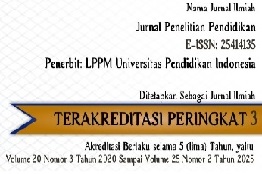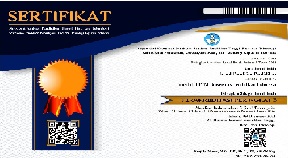Pengaruh Penggunaan Bot Werewolf Telegram pada Penguasaan Kosakata Siswa Sekolah Menengah Atas
Abstract
Abstrak
Masalah dalam mempelajari kosakata melalui messenger instan berakar dari kurangnya adaptasi kontekstualisasi yang menjadi tujuan multimedia. Walaupun penelitian tentang messenger instan menunjukan pengaruh positif pada penguasaan kosakata, keberadaan bot diharapkan bermanfaat dalam mengadaptasi kontekstualisasi pembelajaran kosakata khususnya dalam membaca. Penelitian ini bertujuan untuk meneliti penggunaan Bot Werewolf Telegram dalam pembelajaran bahasa Inggris, terutama dalam penguasaan kosakata, sebagai salah satu implikasi pedagogis yang disimpulkan berdasarkan isu-isu dari kemajuan teknologi saat ini. Penelitian ini menggunakan metode kuasi-eksperimental dan teknik purposive sampling dengan instrumen tes penguasaan kosakata. Eksperimen dalam penelitian ini melibatkan 60 siswa SMA untuk berinteraksi di grup chat dengan serangkaian bot di Telegram. Data dianalisis secara kuantitatif dengan menggunakan kerangka penguasaan kosakata melalui interaksi siswa dalam aplikasi. Hasil analisis menunjukkan bahwa terdapat perbedaan yang signifikan antara penggunaan Bot Werewolf Telegram dan placebo treatment pada penguasaan kosakata siswa SMA. Hal ini mengimplikasikan penggunaan Bot Werewolf Telegram dapat meningkatkan kemampuan kosakata siswa SMA secara positif dan mempermudah identifikasi karakteristik kosakata yang dipelajari siswa agar sesuai dengan tujuan instruksional kurikulum dalam konteks pembelajaran bahasa Inggris sebagai bahasa asing.
Kata Kunci: Bot, Penguasaan Kosakata, SMA, Telegram, TIK.
Abstract
Problems in learning vocabulary through instant messenger seem to take root in the lack of adaptable contextualization which the multimedia aims to facilitate. Although research on the use of instant messengers show positive effects on vocabulary mastery, the existence of bots may be useful in adapting the contextualization of learning vocabulary, especially in reading. This paper aims to investigate the use of Werewolf Telegram Bot in learning English, especially in vocabulary mastery, as one of the pedagogical implications concluded from the burning issues of technological advancement. To collect the data, the study employed quasi-experimental method and purposive sampling technique with a vocabulary mastery test. The study involves 60 senior high school students who interact in a group chat with a set of bots in Telegram. The data were analyzed quantitatively in terms of vocabulary mastery through the students’ interaction within the application. The results of the analysis reveal that there is a significant difference between using Werewolf Telegram Bot and the placebo treatment on senior high school students’ vocabulary mastery. The findings in current research imply that the use of Werewolf Telegram Bot positively improve senior high school students’ vocabulary mastery and allow identification of vocabulary characteristics that the students learn as instructional goal in the curriculum in English as Foreign Language context.
Keywords: Bot, ICT, Senior High School, Telegram, Vocabulary Mastery.
Keywords
Full Text:
PDF (Bahasa Indonesia)References
Abu-Ayfah, Z. (2019). Telegram app in learning English: EFL students’ perceptions. English Language Teaching, 13(1), 1-51. https://doi.org/10.5539/elt.v13n1p51.
Alakrash, H. M., Razak, N. A., & Bustan, E. S. (2020). The effectiveness of employing Telegram application in teaching vocabulary: A quasi experimental study. Multicultural Education, 6(1), 151–159. https://doi.org/10.5281/zenodo.3905099.
Alhawiti, M. (2015). The Effect of Mobile Language Learning on ESP Students’ Achievement. Journal of Modern Education Review, 5(3), 272-282.
Amry, A. (2014). The impact of using WhatsApp mobile learning activities on the achievement and attitudes of online students using mobile devices at the university. European Scientific Journal August, 10(22).
Azadi, M., & Azad, M. (2017). On the effect of mobile and electronic learning (ME learning) on reading rate and reading comprehension of Iranian elementary EFL learners. Proceedings of the 15th International TELLSI Conference. Islamic Azad University.
Bhakti, S. (2017). Vocabulary Mastery by Using Storytelling. Journal of Linguistic and English Teaching, 88-89.
Cakir, I. (2015). Opinions and Attitudes of Prospective Teachers for the Use of Mobile Phones in Foreign Language Learning. Contemporary Educational Technology, 6(3), 72-76.
Cohen, J. (1992). Statistical Power Analysis for the Behavioral Sciences. Lawrence Erlbaum Associates.
Dalton, B., & Grisham D. (2011). eVoc Strategies: 10 ways to use technology to build vocabulary. The Reading Teacher, 64(5), 306–317. International Reading Association.
Faramarzi, S., Tabrizi, H, H., & Chalak, A. (2019). Telegram: an instant messaging application to assist distance language learning. Teaching English with Technology, 19(1), 132-147.
Furqon, F. (2013). Correlation between Students’ Vocabulary Mastery and Their Reading Comprehension. Journal of English Education, 1(1), 68-80.
Ghobadi, S., & Taki, S. (2018). Effects of Telegram stickers on English vocabulary learning: Focus on Iranian EFL learners. Research in English Language Pedagogy, 6(1), 139-158.
Hakim, M. F. F. (2019). The use of Telegram to facilitate students’ vocabulary learning at SMPN 1 Surabaya. [Bachelor paper, UIN Sunan Ampel]. UIN Sunan Ampel Digital Library. http://digilib.uinsby.ac.id/id/eprint/32611.
Hunt, A., & Beglar, D. (2005). A framework for developing EFL reading vocabulary. Reading in a Foreign Language, 17(1), 24-59.
Karimov, O., & Kim, H. (2017). Factors of UTAUT affecting the user behavior based on Telegram application in Uzbekistan. Asia-Pacific Journal of Multimedia Services Convergent with Art, Humanities, and Sociology, 7(12), 831-840.
Kayzouri, A. H., Mohebiamin, A., Saberi, R., & Bagheri-Nia, H. (2020). English language professors’ experiences in using social media network Telegram in their classes: A critical hermeneutic study in the context of Iran. Qualitative Research Journal, 21(2), 124–134. https://doi.org/10.1108/QRJ-02-2020-0008.
Khodarahmi, Z., & Heidari-Shahreza, M. A. (2018). Effect of MALL on the acquisition of word stress patterns of English by Iranian EFL learners: The case of Telegram. Journal of Applied Linguistics and Language Research, 5(1), 40-55.
Mashhadi H. D., & Kaviani, M. (2016). The Social impact of Telegram as a social network on teaching English vocabulary among Iranian intermediate EFL learners (Payam Noor Center). Journal of Sociological Studies of Youth, 7(23), 65-76.
McWhorter, T. (1992). College Reading and Study Skills. Niagara Country Community College.
Movafagh, A. E. (2017). The effect of using Telegram messenger on vocabulary learning of Iranian EFL learners. Language Education Studies, 3(4), 1-9.
Nafis, M., Faridza., & Melor. (2018). Enhancing English language learning and teaching via Qgram (Telegram and Quizlet) innovation. International Journal of Academic Research in Progressive Education and Development, 7(4), 435–446. http://dx.doi.org/10.6007/IJARPED/v7-i4/5344.
Nation, I. S. P. (2001). Learning vocabulary in another language. Cambridge University Press.
Niyayesh, U. (2015). Number of Iranian using Telegram mobile app increases to 13 million. Trend News Agency. Azerbaijan.
Prensky, M. (2001). Digital Natives, Digital Immigrants. On the Horizon Report. NCB University Press.
Taylor, J. N., & Perfetti, C. A. (2016). Eye movements reveal readers’ lexical quality and reading experience. Reading and Writing, 29, 1069–1103.
Radfar, Z. H. (2017). The effects of ICT-based learning on students’ vocabulary mastery in junior high schools in Bandung. International Journal of Education, 10(2), 149-156.
Rajab, A., Zakaria, W. Z. W., Rahman, H. A., Hosni, A. D., & Hassani, S. (2012). Reading anxiety among second language learners. Procedia - Social and Behavioral Sciences, 66, 362-369.
Sugiyono. (2017). Metode penelitian kuantitatif, kualitatif, dan R&D. Alfabeta.
Syakriah, A. (2019, November 19). Changes to state university admission keep students on edge. The Jakarta Post. https://www.thejakartapost.com/news/2019/11/19/changes-to-state-university-admission-keep-students-on-edge.html.
Wahyuni, S. (2016). The Effect of Blended Learning Model towards Students’ Writing Ability. Journal of English for Academic, 5(2). 97-110.
Wiranegara, D. A., & Hairi, S. (2020). Conducting English learning activities by implementing Telegram group class during Covid-19 pandemic. Journal of Teaching English for Academic and Specific Purposes, 3(2), 104–114. https://doi.org/10.18860/jeasp.v3i2.11122.
Xodabande, I. (2017). The effectiveness of social media network Telegram in teaching English language pronunciation to Iranian EFL learners. Cogent Education, 4(1). 1-14. https://doi.org/10.1080/2331186X.2017.1347081.
DOI: https://doi.org/10.17509/jpp.v21i2.37421
Refbacks
- There are currently no refbacks.
Copyright (c) 2021 Jurnal Penelitian Pendidikan
ISSN: p.1412-565X e.2541-4135
Jurnal Penelitian Pendidikan (JPP), Universitas Pendidikan Indonesia 
This work is licensed under a Creative Commons Attribution-ShareAlike 4.0 International License


